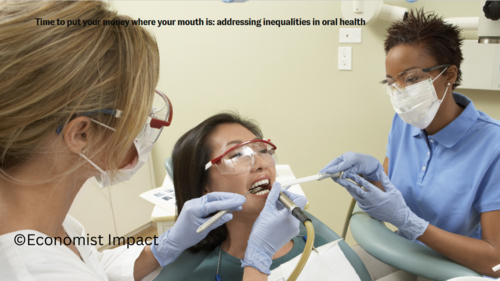
In the heart of Southeast Asia, Indonesia faces a silent epidemic that affects millions: the burden of caries and periodontitis. These oral diseases, impacting about 2 billion (caries) and 1 billion (periodontitis) people globally, pose significant health and economic challenges, particularly in countries with vast socioeconomic disparities like Indonesia. The situation is dire, with oral diseases surpassing all other non-communicable diseases (NCDs) in terms of global prevalence, yet they remain largely overlooked within the mainstream NCD framework.
The World Health Organization's 2021 resolution emphasised the need for a preventive approach to oral diseases, integrating oral care with broader NCD care within the universal health care (UHC) agenda. Despite this, oral health scarcely receives the attention it deserves, overshadowed by other NCDs and their risk factors, notably the consumption of simple/refined sugars.
According to the new Economist Impact white paper on the burden of caries caries and periodontitis, in Indonesia, the economic implications are stark. Although Indonesia has the lowest per-person costs of caries management at $7,414 USD for individuals aged 12-65 years, the figure belies the disproportionate impact on the country's most deprived populations, who experience not only higher rates of disease, but also greater economic burdens due to inadequate preventive efforts and access to care. According to the white paper, the average number of decayed teeth among 12-year-olds is 1.8, the highest number among the countries in the report. This goes up to 3.53 in the most deprived quintile. The total cost of caries in the population of Indonesia (12 to 65 years) is more than 26,2 billion US$.
Oral diseases in Indonesia are not just a health issue but a reflection of broader social inequities. Socioeconomic deprivation is linked to lower awareness of oral self-care, higher consumption of sugary foods and drinks, and limited access to essential preventive measures and treatments. This results in a vicious cycle where the most vulnerable populations bear the brunt of the burden.
Melissa Adiatman, a lecturer at the University of Indonesia’s Department of Dental Public Health, highlights that treatment for oral problems was among the top ten causes of highest healthcare expenditure in 2020 and 2021. This underscores the urgent need for enhanced preventive care and equitable access to dental services, particularly in rural and underserved areas. Professor Diah Ayu Maharani, also of the University of Indonesia, points out the significant rural-urban divide in access to oral healthcare, with a concentration of dentists in urban centres and limited services reaching the more remote populations.
The disparities in care and the economic impact of caries in Indonesia present clear opportunities for intervention. Prevention must be improved at all levels and among all age groups. Although the private sector organises an oral health day programme in Indonesia annually, this is not enough.
The data suggests a pressing need for policies that prioritise oral health and preventive measures, as well as expanding the dental workforce and integrating oral health services into the broader health care system.
Implementing community-wide prevention programmes, early oral health education, applying a sugar tax, and ensuring equitable access to fluoride toothpaste (now on the WHO list of essential medicines) and fluoridated water are critical steps toward addressing this public health challenge. By leveraging the WHO's recommendations and focusing on equitable health solutions, Indonesia can bridge the gap in oral health disparities, ensuring a healthier future for all its citizens.
"The high burden of oral diseases in Indonesia highlights the critical need for action to address the inequalities in oral health,” said Professor Nicola West, secretary general of the EFP. “By prioritising prevention and integrating oral health into the universal health care agenda, the economic and health impacts of caries and periodontitis can be significantly reduced in Indonesia and beyond.”





